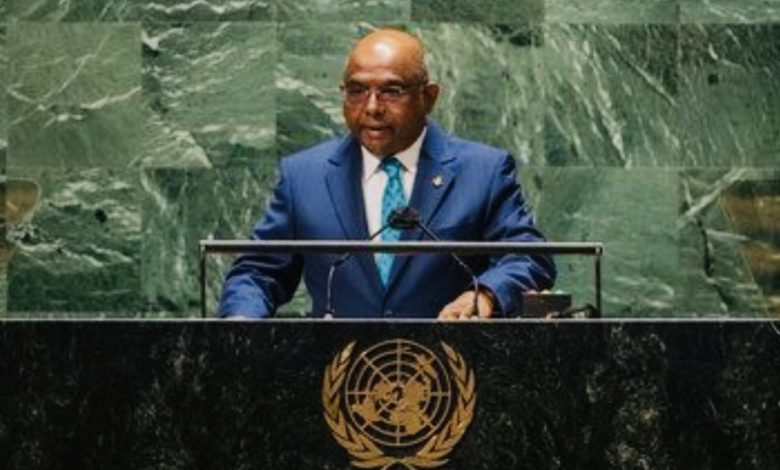REMARKS BY THE PRESIDENT OF THE 76TH SESSION OF THE GENERAL ASSEMBLY, ABDULLA SHAHID Address at the Informal Plenary on the 40th Commemoration of UNCLOS

Rashad Alkhader from UN
Excellencies,
Distinguished colleagues,
I am delighted to welcome you all to the commemoration of the 40th Anniversary of the adoption of the UN Convention on the Law of the Sea, or UNCLOS.
Recognized as the ‘Constitution of the Sea’, UNCLOS is perhaps one of the most successful outcomes of rules-based multilateralism – culminating in a legally-binding document for our Ocean.
Today, UNCLOS continues to play a fundamental role in the development of international law, and in the promotion of peace, security, cooperation, friendly relations among all nations, and sustainable development of the ocean and sea.
As we commemorate this significant day, we must avail the opportunity to reflect on the achievements of UNCLOS, its universal and unified character, and take stock of our progress in its implementation.
Since its inception, UNCLOS has laid the foundation of ocean governance, with the first single set of rules for our ocean and seas.
As the General Assembly has recognized in several resolutions, the Convention sets out the legal framework within which all activities in the ocean and seas must be carried out.
This has helped spur governance on all aspects related to the ocean, including maritime zones, navigational and passage rights, the protection of the marine environment, marine scientific research, and dispute settlement.
Since its adoption, two additional instruments were concluded under the Convention: the 1994 Agreement on the implementation of Part XI of UNCLOS and the 1995 UN Fish Stocks Agreement.
A third treaty under UNCLOS, on Marine Biodiversity of Areas Beyond National Jurisdiction, or BBNJ, is currently being negotiated in the Intergovernmental Conference convened under the auspices of the United Nations, as decided by the General Assembly in the 72nd session.
Likewise, the Convention has provided the framework for the creation of three new bodies: The International Tribunal for the Law of the Sea (ITLOS), the International Seabed Authority (ISA) and the Commission on the Limits of the Continental Shelf (CLCS), promoting a stronger, peaceful, and rule-based use of the ocean.
I am proud to note that High-level representatives of each of these bodies will deliver keynote remarks today, together with other distinguished guests, to share their expertise and insights.
My friends,
Each of these successes is cause for encouragement and I would thank each of you, the Member States, for supporting the processes that have made UNCLOS a success.
That said, human activities during the past 40 years continue to create challenges on the social, economic and environmental dimensions, which are also at the core of the Convention.
As recognized by the Second World Ocean Assessment, many pressures from human activities continue to degrade the ocean, including those associated with climate change; unsustainable fishing, including illegal, unreported and unregulated fishing; atmospheric pollution causing acidification; excessive inputs of hazardous substances, including plastics, microplastics and nanoplastics; anthropogenic noise; and ill-managed coastal development, among others.
Countless species are also on the brink of extinction, and entire homelands face the existential menace of rising sea levels.
The Ocean covers more than 70% of our planet’s surface and accounts for most of the oxygen we breathe. The ocean provides food, jobs, and resources to billions of people.
At times, we seem oblivious to the harm we are doing to it – irrespective of the fact that our existence on this planet is entirely predicated on us having a healthy ocean ecosystem.
Yet, renewed attention to the health of the ocean at the United Nations, with the General Assembly at its core, and in other international platforms gives us cause for hope.
The recent, Member State endorsement of the historic resolution at the UN Environment Assembly in Nairobi to End Plastic Pollution and forge an international legally binding agreement by 2024 that will address the full lifecycle of plastic, including its production, design and disposal offers tremendous hope for a future of plastics free oceans.
Dear friends,
The legacy of the ocean go beyond its economic value. It is a lifeline. It is history and culture. And it is an identity.
Together with the provisions of UNCLOS, we can build upon recent developments to accelerate action for the protection of this precious natural resource.
I believe I speak for many here today when I say that the success of UNCLOS would not have been possible without the collective commitments and support of this membership. I congratulate each and every one of you on this significant milestone.
I would also like to acknowledge the work and contribution of pioneers, such as Ambassador Tommy Koh, who steered the early negotiations which brought UNCLOS to life.
Similarly, I would recognize the role of the Division for Oceans Affairs and the Law of the Sea of the Office of Legal Affairs, which continues to guardian our common achievements on this front.
I would also like to specially thank the delegations of Singapore, Denmark, Grenada, Kenya and Portugal for their letter of 17 December 2021 requesting me to convene today’s commemorative event.
With preparations separately underway for the UN Ocean Conference in Lisbon, I call upon all Member States to renew our unwavering commitment, support and advocacy to protect and promote our ocean.
Let us continue to work together for 40 more years of success; let us recommit to the principles and values of multilateralism, and strengthen our commitments to the protection of oceans and seas.





